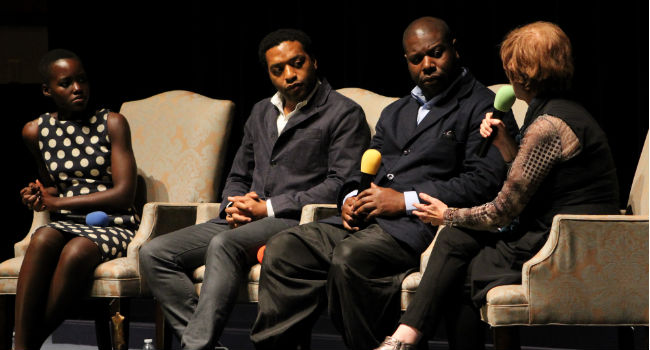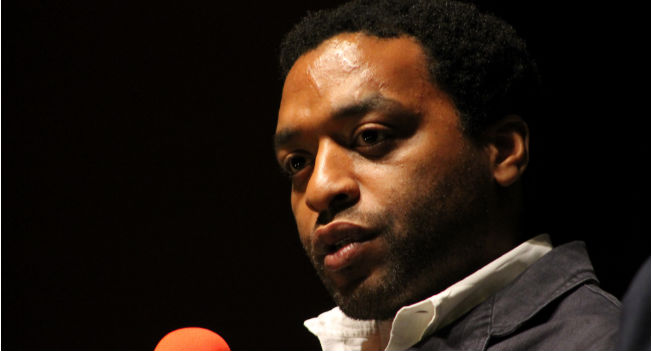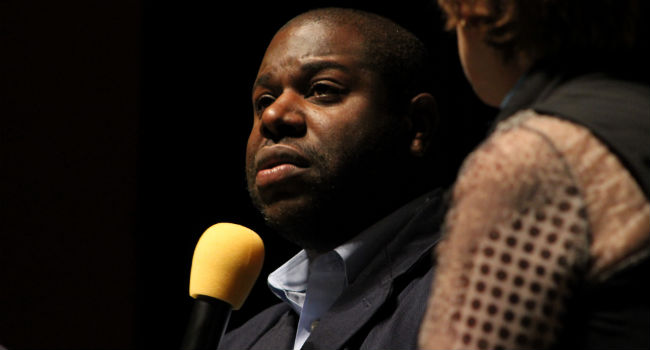12 Years a Slave Q&A (Mill Valley Film Festival)

At the 36th Mill Valley Film Festival last week, one of the biggest highlights in the festival’s stunning lineup was Steve McQueen’s (Shame, Hunger) highly-anticipated new film, 12 Years a Slave (which opens today) see our review, based on the autobiography and life story of Solomon Northup, a free black man who was abducted and sold into slavery in 1841. On what was perhaps the most emotional and moving night of the festival, McQueen and stars Chewetel Ejiofor (Children of Men) and newcomer Lupita Nyong’o took the stage to participate in a Q&A with the still-reeling audience.
12 Years a Slave is in theaters today.
On what sort of change has come from, or will come from, the film:
Nyong’o: Being in that woman’s world has changed my life. My understanding of slavery will never be the same, because I’ve had the opportunity to take that part of history so personally. I’m hoping that will be the case for everyone who gets to see it.
Ejiofor: I think there was a life before this experience and a life afterwards. Some of that has to do with nature and some of that is the process of making it and the way in which Steve works with actors and the crew. The way everyone is determined and allowed to gain their creativity through the process and are encouraged to give 100%. Everybody wants to do that, but it’s great to have somebody articulate that desire. The process has changed my relationship with the way I think. The overall theme and situation was directly personal for me as an actor.
McQueen: The whole point of me making this film was because of this book. I wanted to make a film about slavery because I felt–within the canon of film–this particular subject hadn’t been tackled. My wife found this book, I read the book, and I was astonished by it. I was astonished by two things: First of all, I didn’t know the book. I was ashamed of myself, angry at myself. How did I not know this book? Everybody knows Anne Frank’s diary, right? Every school should have 12 Years a Slave on their curriculum. That’s my aim with this film–every school should have this book in their curriculum. As far as change is concerned, that would be a big change, if that’s at all possible. It’s all about evidence and getting things done.

Ejiofor on McQueen’s process and getting to the core of the characters:
Ejiofor: We had this fundamental thing, that Solomon Northup had the ability and faculty to write about his experiences in this incredibly detailed way so soon after these things happened to him. He wrote about these things with a great amount of humility. The book cries out, “This is what happened”, and it has this power of its own reality. Going through it and being connected to that experience, which is Solomon and his journey, I was constantly reminded by the book and what Steve and John (Ridley) had done with the screenplay, that this was the truth. You could touch its tangible reality, that everything he describes is complex in the way that people are complex. Everything is three-dimensional in the way that people are. All the relationships, personalities, and characters involve you in the system of their society, and it is just a slice of their entire reality. That was the most powerful touchpoint for me when I read the screenplay. For a while, before I really engaged with the biography, I saw the story as a kind of overall story about something that happened to this man. I didn’t see it accurately until later, when I realized it was about this specific individual and his worldview that has made it possible for him to survive this experience with his mind intact.
On if there is an advantage to being non-American when telling this story:
McQueen: I’m not a nationalist, so I don’t really care. The only difference between me and a person born [in the U.S.] of African descent is that their boat when right and my boat went left. My parents are from the West Indies. My father’s from Grenada, my mother is from Trinidad. Malcolm X’s mother was born in Grenada. Stokely Carmichael, the man who coined the phrase “Black Power”, was from Trinidad. It’s much more complex to talk about American or British or European. It’s more complex than any sort of nationality. Talking to my grandmother who passed away recently, she spoke about how her grandmother was a slave. There’s no real difference other than our geography.
Ejiofor: I’ve never walked in another man’s shoes. I know that this story is about something very universal. It’s about history, and slavery is one aspect of that, but what Solomon’s story speaks to, to me, is something that involves everybody. It’s about the ideas of human respect and dignity, and how those things, in specific circumstances, are dealt with. 95% of the people working on this film, on every level, are Americans. It’s a very American story. There’s an international aspect because some of the people involved in making the film are from other countries, but that is also, to me, correct. It has an international reality.
McQueen: It’s like Harry Belafonte or Sidney Poitier, these Black American actors who are from the West indies. I remember a line by James Brown: “It’s not who you are–it’s where you’re at.”
On if the film was informed by cinema’s lack of stories about slavery:
McQueen: [12 years] wasn’t informed by cinema at all. It was informed by the book. I didn’t look at films or references. The book was enough. You turn the pages and you get images in your head. Filmic references weren’t necessary, because landscape is so rich–you just try to find stuff with the camera. Sometimes, having other people’s images in your head gets too busy as opposed to when something is right in front of you within reality. We looked at the book and found things as we were present in these plantations in Louisiana.

McQueen on the originality of his filmmaking process:
McQueen: For me, it’s like being blindfolded and thrown into someone’s apartment and having to negotiate around that particular space using your other senses: taste, smell, hearing. It’s a different way of navigating your way around the room, and when you do that, you bring a different set of sensibilities to certain things rather than the obvious ones, and that’s sort of interesting.
On what informs McQueen’s choices to shoot certain scenes as one-shot takes as opposed to shooting traditional coverage:
McQueen: I don’t do coverage. For me, it’s a waste of time because I know what I want. I was very fortunate to have been given a Super 8 camera when I was 18. That Super 8 camera was so expensive that I couldn’t just shoot willy-nilly like people do now. I had to be very precious with a shot, so I’d look into the lens and, when I found what I wanted, I’d shoot it. That trained me to look before I shot. I didn’t spray like an AK-47 everywhere. It trained my eye.
On what sort of discussions and reactions the film will spark:
Ejiofor: You can’t make films in terms of what reactions you’re going to get or what the wider objectives are, entirely. You try to tell a story that you think needs to be told, that you think is powerful. When I first read the script, I was very aware of what it would mean. I felt the weight of its responsibility. I felt the weight of the responsibility in terms of Solomon himself and his descendants, but also in terms of telling a story from inside the slave experience in a way I’d never seen done before and what that might mean. I had to take pause before I accepted the job.
McQueen: You said no.
Ejiofor: It’s been the subject of some debate (laughs). I couldn’t give an immediate “yes”, which is part and parcel of the nature of the story. The truth is, there’s a whole other thing that happens as well, which has nothing to do with the wider aspects of [the film]. There are personal things. I’m an actor, and I have my own senses of what my limitations are. They’re sometimes false, but I sometimes have that voice in my head. You wait all your life for these great scripts. You hassle your agent. Suddenly, you’re presented with something really remarkable, and your first instinct is to say, “I don’t know if I can do this, actually.” I was confronted with that reality, and it didn’t take anybody to convince me out of that, but I went back to the book and the screenplay and found a point of contact for me, which was, in the end, Solomon. In a weird way, I suppose that comes towards answering the question. The journeys that you make when telling stories are personal to you, and how you tell them is about what your heart tells you. What you feel. What your own journey is. I wasn’t considering [the project] in the sense of its wider reality. I knew that I felt it was important, and Solomon was somebody who was forgotten and shouldn’t be. Ultimately, that’s what I hope people take away from it.
Nyong’o: What I’m excited about when sharing this film is that it gives us a common story, a common reference point, to start talking about things. When I first watched this film, I watched it with my best friend who is half black, and my agent and manager who are both white. After about an hour of crying we went to a restaurant and had a conversation about our relationship with other races in a way that I don’t think would have happened without this film. Those are the kind of things that I’m excited are happening. That’s the power of film. What seems so distant in the past is brought to the present.
